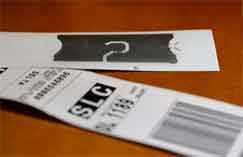| |
|
| |
|
 |
Supply
Chain by the Numbers |
| |
|
| |
- Sept. 8, 2016 -
|
| |
|
| |
|
| |
|
| |
Walmart Further Tightens the Screws on Suppliers; Delta Says RFID is Reducing Lost Baggage in a Big Way; Amazon Cuts Cross-Border Delivery Time; Hanjin Fail Causes Global Logistics Chaos |
| |
|
| |
| |
| |
2 |

|
|
|
| |
| |
|
$14 Billion
|
|
Incredibly, that is the estimate of the value of goods currently stranded at sea as the result of the bankruptcy filing last week by South Korea's Hanjin Shipping Co. Dozens of ships carrying more than half a million cargo containers have been denied access to ports around the world because of uncertainty about who would pay docking fees, container-storage and unloading bills. Some of those ships have been seized by the company's creditors. For example, Samsung Electronics Co., also from South Korea, said it has cargo valued at about $38 million stranded on Hanjin ships in international waters. "People are still trying to figure out how to get their boxes off the boat and move them," said Nate Herman, a senior vice president for the American Apparel & Footwear Association. Bankruptcy filings in its home country and some others may help, actually, but shippers and brokers say the rulings don't solve the shipping line's problems in the US, as it is unclear whether Hanjin will be able to afford to have the ships unloaded once they dock. Moreover, the courts' rulings don't necessarily apply to ports in Asia and Europe. Quite the mess. |
| |
| |
|
| |
| |
99.85% |
 |
That is the read rate of RFID bag tag labels that Delta airlines is experiencing as it continues to roll out its new $50 million luggage tracking systems first announced a few months ago. That compares with 90% or so scan rates for traditional bar code baggage tags, with most non-scans related to the orientation of the bar code versus the scanner – not an issue with RFID. With the Delta system, as luggage enters the belly of a plane, a reader on the belt mechanism will scan that bag tag and verify that it has been loaded onto the correct aircraft. Ultimately the system will include RFID readers on 1,500 belt loaders in 84 of its busiest airports, with a wider network of 4,600 RFID readers, 3,800 printers, and 600 pier-and-claim readers across a labyrinth of conveyor belts in 344 airports, allowing it to pinpoint any missing item's last-known location Delta is reported to be paying less than 10 cents per RFID bag tag, versus 3 cents for a traditional bar code label - but the airline hopes it will make that back in lower costs associated with lost luggage and increased preference by flyers. |
| |
| |
|
|
|
| |
 |
 |
| |
|
|
| |